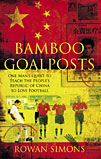 by Rowan Simons
by Rowan Simons
Macmillan, £14.99
Reviewed by Ben Lyttleton
From WSC 260 October 2008
All eyes were on China in August as Beijing proved, with the odd journalist-napping aside, to be an excellent host city for the Olympics. Rowan Simons has spent most of the past 20 years living in China and this book charts his period in the country, from his student days watching the Tiananmen Square massacre in 1989 to his rise as a football pundit (though not a very good one as one of his favourite lines is “He’ll never score with a haircut like that”) and a political figure trying to create more pitches and more opportunities for Chinese amateur footballers.
This is the legacy he craves – the book is modestly subtitled “One Man’s Quest to Teach the Republic of China to Love Football” – though he is far from achieving it. He was stunned by China’s lack of amateur clubs, though perhaps should not have been given that in the 1980s the Communist government banned organised matches, unless they involved an elite sports team, deeming them a “group activity”. He has since set up a business-cum-social-club that gives Chinese enthusiasts the chance to play. He deserves plenty of credit for the desire to give something back to his adopted homeland – and for his patience and persistence when his efforts repeatedly hit one great wall after another.
It is this struggle that dominates the second half of the book, which is certainly more rewarding than the first half, an all-too-detailed account of the author’s student days and early years as a journalist. These include his aborted efforts to file a piece on the 1991 Women’s World Cup for WSC, because he lacked, as he put it, “the ironic wit shown by their contributors”.
Unsurprisingly, Simons has become a popular public figure among football viewers in the country, where he sees himself as “a lone foreign voice in the state media… and a slowly radicalised foot-soldier in the world’s largest unfulfilled grassroots sports revolutions”. The first of these roles forced him to learn the Chinese names for football clubs. Newcastle, for example, is pronounced “Niu-Ka” in Chinese, which comes out literally as Cow Card Ugly. Others include Tie Up, Drag Out (Aston Villa), Pander to Multiple Payments (Arsenal) and Crazy Irritation (Tottenham, of course). The second has allowed him to rub shoulders with the likes of Sir Bobby Charlton and Peter Kenyon.
The Olympics represent the perfect counterpoint to his argument: Beijing’s futuristic new stadiums will lie empty after the Games, while a Simons-inspired community-based football centre in south Beijing will serve thousands of players at the bottom of the sport’s pyramid. It remains to be seen whether China will ever truly embrace the game and, as long as that remains in the balance, Simons will battle on. In the meantime, his book serves as a poignant reminder that for all the modernity on display in Beijing, New China remains a society where politics and profit review come first.